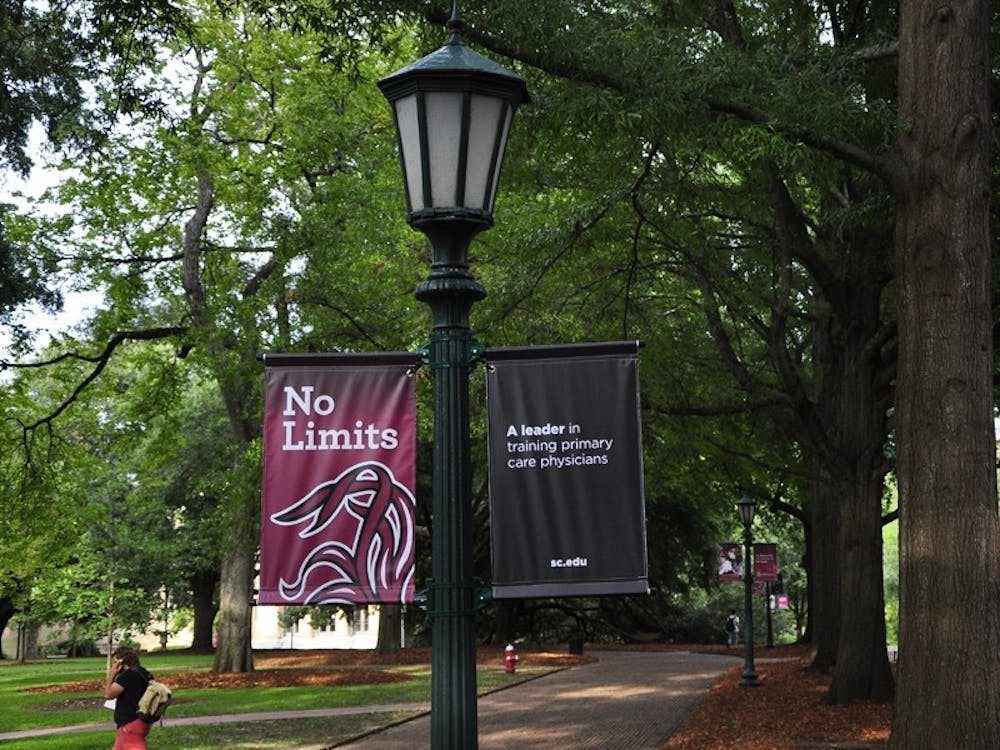University aims to improve national reputation
For years, USC has had something of an identity crisis.
Outside of the state, the university lacks a cohesive image, and its nicknames — “USC” and “Carolina” — have already been snatched up by the universities of Southern California and North Carolina.
The university will work to create one with a new marketing campaign that rolls out today with President Harris Pastides’ State of the University address and will stretch over the next three years. It marks the first unified marketing effort USC has attempted, said Luanne Lawrence, the vice president for communications.
The university’s marketing department was formed after Lawrence joined the university two years ago.
Since then, it’s received an annual budget of $300,000 and seen the creation of three new positions: directors for strategic and presidential communications, strategic marketing and Web communications.
Respondents in USC’s market research, which concentrates mostly on the South, said they regarded the school for the access to education and good value it provides.
But they didn’t associate it with innovation, personalized attention or a national reputation for excellence, Lawrence said.
The effects of those perceptions show up elsewhere, too, like in the U.S. News & World Report’s annual college rankings.
USC slipped a few spots in the rankings this year, even though its core statistics, like the size of its faculty and percentage of professors with terminal degrees, have improved, according to Provost Michael Amiridis.
The reason, he said: Its reputation nationally hasn’t improved.
Changing reputation
The new campaign will try to change that by focusing on reconnecting alumni with the school and introducing a more cohesive image, centered around the slogan “No Limits” and the flourish of a gamecock’s tail, which Lawrence called “the most elegant part of the bird.”
Alumni, Lawrence said, can help talk up the university across the country, recruit new students and make donations.
USC will buy ad space in markets where the Alumni Association says it has especially strong local groups, including in Chicago, Los Angeles and cities along the East Coast.
When it does, it’ll focus on highlighting the university’s academic achievements, conveying the spirit and fervor of athletics and showcasing both with a human face.
The campaign, Lawrence said, will focus on the university’s personal stories in brochures, ads and a redesign of its alumni magazine, Carolinian.
Doing so faces one main roadblock, Lawrence said: An unusual humility.
As writers have approached students and alumni for interviews, they’ve asked, “Why me?” Lawrence said.
For some reason, she said, students are unusually modest at USC, a school with a with a well-established “next year” attitude in athletics.
To sell the university to the rest of the country, Lawrence said, the campaign will have to sell it on campus, too.
Banners showcasing USC’s accomplishments have gone up around the Horseshoe, an aspect of the campaign Lawrence hopes will “knit” the community together.
But USC’s reputation has also been tied to its home state’s, which has caused issues of its own.
Two years ago, the university conducted a survey that asked what people associate with South Carolina.
In order, they were: the Confederate flag at the Statehouse, former Gov. Mark Sanford’s trip to Argentina, its beaches, golf and tennis, Lawrence said.
“I want to be known for smart people, and we’re not,” she said.
A new image
Lawrence said she still wants the university to bear the state’s name, even as it distinguishes itself from it.
“When you’re in Alabama and you ask someone, ‘Where’d you graduate from?’ they say ‘Alabama,’” Lawrence said. “Why can’t we say ‘South Carolina’? Own the state.”
But when outsiders think of the university, Lawrence hopes they’ll think of it as “a beacon of hope” within a state riddled with poverty.
That, she said, shows the university as a destination and could eventually help elevate the image of the state itself.
Those are key focuses of a campaign that aims to bring the university onto the national stage and into a positive light.
“I think it’s about time this institution has a national reputation,” Lawrence said. “It’s better than it’s thought to be ... Nobody knows how good it is.”

